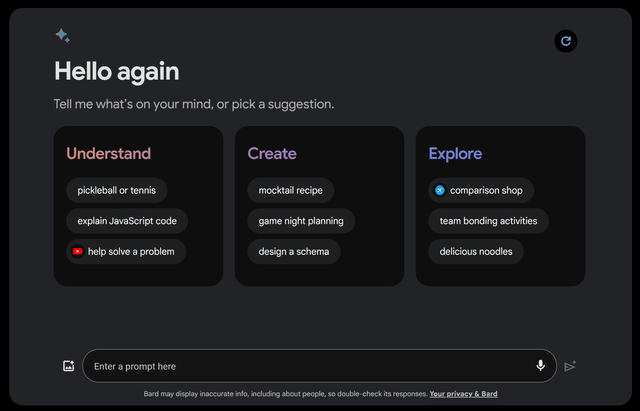Summary:
- OpenAI CEO Sam Altman was recently fired amid reported disagreements over AI safety /board transparency.
- OpenAI’s effectiveness to ship product may be affected by the shakeup.
- Microsoft hasn’t gained anything on a net basis by hiring Sam Altman and Greg Brockman, as they already were exposed to the duo via a 49% stake in OpenAI.
- Bringing Sam into a bureaucracy within Microsoft or returning him to a wounded OpenAI will likely reduce product momentum in either case.
- Google’s chatbot competitor, Bard, should benefit and capture market share, thus retaining users and keeping them within Google’s profitable ecosystem.
pcess609
In case you’re living under a rock, there’s been some big developments going on in the world of AI this last week.
The Story So Far
On Friday, November 17th, Sam Altman, the CEO of OpenAI, was fired by the board of the upstart AI company – the makers of the extremely popular ChatGPT AI chatbot.
The reasons behind the firing are hotly contested:
US media outlets reported that Altman was pushed out of the company because of disagreements over the safety of AI.
The company’s interim chief executive Emmett Shear denied this writing on X, formerly twitter: “The board did *not* remove Sam over any specific disagreement on safety, their reasoning was completely different from that.”
Whatever the reasoning, the shock firing caused a firestorm of activity across the industry. Mira Murati, an OpenAI exec, was tapped to lead the company as an interim CEO, until she was replaced only a few hours later by Ex-Twitch CEO Emmett Shear.
There were rumors that OpenAI had done an about-face and were looking to hire Sam back, but those rumors were put to bed when Microsoft (MSFT) scooped up Sam and his lieutenant Greg Brockman Monday morning. Shortly after, nearly all of OpenAI’s employees signed an open letter to OpenAI’s board threatening to quit and join Altman at Microsoft, should he fail to be re-instated as CEO.
The letter also demanded that the board resign, due to poor decision making.
Monday evening, Satya Nadella complicated matters, claiming:
“[We’re] committed to OpenAI and Sam, irrespective of what configuration,” said Nadella in an interview with CNBC’s Jon Fortt, adding that Microsoft “chose to explicitly partner with OpenAI [and] obviously that depends on the people at OpenAI staying there or coming to Microsoft, so I’m open to both options.” Nadella added that “obviously we want Sam and Greg to have a fantastic home if they’re not going to be [at] OpenAI, with all the colleagues at Microsoft, but I’m exactly where I was on Friday morning.”
In other words, things are still developing. It’s not clear where Altman will end up, but it’s possible that he’ll be heading up an AI research unit within Microsoft. Alternatively, he may be re-instated at OpenAI, if the board decides to re-hire him, or if new board members are instated to achieve that goal.
The fate of the more than 600 employees that work at OpenAI and signed the letter is also up in the air, at the moment.
The Impact
Many are calling this a win for Microsoft. On the surface, that makes sense.
While Microsoft owns 49% of OpenAI and already effectively has a claim on Altman’s output, bringing him within the native Microsoft fold should only serve to improve MSFT’s product line at the source.
Having top talent that knows how to build and implement generative AI applications across the stack should have positive implications for Microsoft’s cloud services, ERP products, search services, office suite, and more.
These competitive advantages should lead to better products and fatter profits.
From a different lens, however, this shakeup could prove to be a massive issue for both OpenAI and Microsoft.
Up to this point, Microsoft and OpenAI had worked in tandem effectively. OpenAI’s ~700 person team was responsible for a disproportionate amount of output relative to headcount, and many think that this was due to their uniquely start-up-like culture:
A few applied engineers, some designers, researchers, and Greg Brockman (OpenAI’s president and co-founder) grabbed a room and started rapidly iterating product ideas.
We gave this nascent group its own code repository and a fresh cluster. The dev environment looked like the first days of a startup or a personal project.
Our goal with this small ChatGPT subteam was to create the atmosphere of an early-stage startup iterating towards product-market fit (PMF.) We wanted to foster the rhythm, pace, and autonomy to do this. Every member of the team was on-site, and we rearranged seating to put people next to each other.
However, now, whether under Microsoft directly or following a new direction within OpenAI’s board, the rapid-iteration mindset and team setup are likely tainted due to the recent upheaval.
Microsoft would have ‘retained’ the talent no matter what, either directly or indirectly, but with added drama and challenges, it’s possible that the OpenAI team will suffer from a reduction in efficiency from the distraction. Alternatively, the team could lose momentum or fall victim to the bureaucracy that Microsoft brings, should things head in that direction.
Additionally, the volatility presents difficult decisions for current API customers. Both OpenAI and Microsoft have tried to project confidence, claiming that everything should continue forward as expected, but risk surrounding mission critical product features, in the eyes of B2B clients, may not be tolerated and alternatives could be sought.
From this angle, it’s hard to see the recent drama as anything but a net negative to OpenAI’s / Microsoft’s team harmony, productiveness, and output.
The Real Winner
Alphabet (Google) (NASDAQ:GOOG), by contrast, has taken a highly corporate approach to Bard, its ChatGPT competitor, from the outset. The company built the product as a corporate imperative and response to ChatGPT, and it’s been playing catchup ever since.
This shakeup and distraction could provide the opportunity Google needs to catch up with OpenAI.
Silently, Bard has already gotten better and better, incorporating Google’s network of features directly into the chatbot, like YouTube and Travel:
Additionally, Google’s been increasing the pace of its Bard updates, which indicates that the company has been ramping up the resources dedicated to turning bard into the pre-eminent chatbot / gen AI product.
Thus, as OpenAI stumbles, Google marches ahead.
Additionally, and this is key, Google’s Bard is still (and will likely remain) a completely free product.
Thus, as output quality converges, it seems possible that Bard’s value proposition will outstrip ChatGPT’s, and Google will retain users to monetize in the myriad ways it does currently.
Anecdotally, we use both Bard and GPT in our personal lives for researching topics (travel), searching for specific information (who won the recent Bills game?), or creating something new (generate a meal plan that’s healthy and cost effective).
For our money, Bard’s outputs have eclipsed GPT-3’s in terms of quality. OpenAI’s app store integrates several nice features into their paid, premium product, but Google’s bard includes many of these functions for free, as we mentioned.
Importantly, Google is also working on a fully integrated fact check system that users can use to ensure the correctness of responses. This is a key issue that both systems will still run into sometimes.
It’s also likely that Google will allow a plugin ecosystem to be built in the future on top of Bard. The company is familiar with marketplace dynamics and should see the value in doing so. Thus, OpenAI’s extensibility moat may weaken due to Google’s distribution advantages.
Summary
As the saying goes, “things go faster in smaller groups, unless you’re trying to move a piano.”
Building a next gen chatbot that users can rely on to improve their daily lives is the business equivalent of moving a piano.
While some may cheer Microsoft’s hiring of Sam Altman and Greg Brockman, it’s likely that the drama surrounding the events of the last week will reduce momentum and allow Google, which has been moving methodically, to capture market and mind share.
Its Bard product has been improving significantly as of late, and its value proposition, as a free product, as well as Google’s distribution advantage, should begin to chip away at GPT’s ‘king-of-the-hill’ position.
Many are bidding up Microsoft stock on this news, but to us, the real long-term beneficiary of the recent upheaval is Google.
Thus, we rate GOOG a “Buy”.
Cheers!
Analyst’s Disclosure: I/we have no stock, option or similar derivative position in any of the companies mentioned, and no plans to initiate any such positions within the next 72 hours. I wrote this article myself, and it expresses my own opinions. I am not receiving compensation for it (other than from Seeking Alpha). I have no business relationship with any company whose stock is mentioned in this article.
Seeking Alpha’s Disclosure: Past performance is no guarantee of future results. No recommendation or advice is being given as to whether any investment is suitable for a particular investor. Any views or opinions expressed above may not reflect those of Seeking Alpha as a whole. Seeking Alpha is not a licensed securities dealer, broker or US investment adviser or investment bank. Our analysts are third party authors that include both professional investors and individual investors who may not be licensed or certified by any institute or regulatory body.

